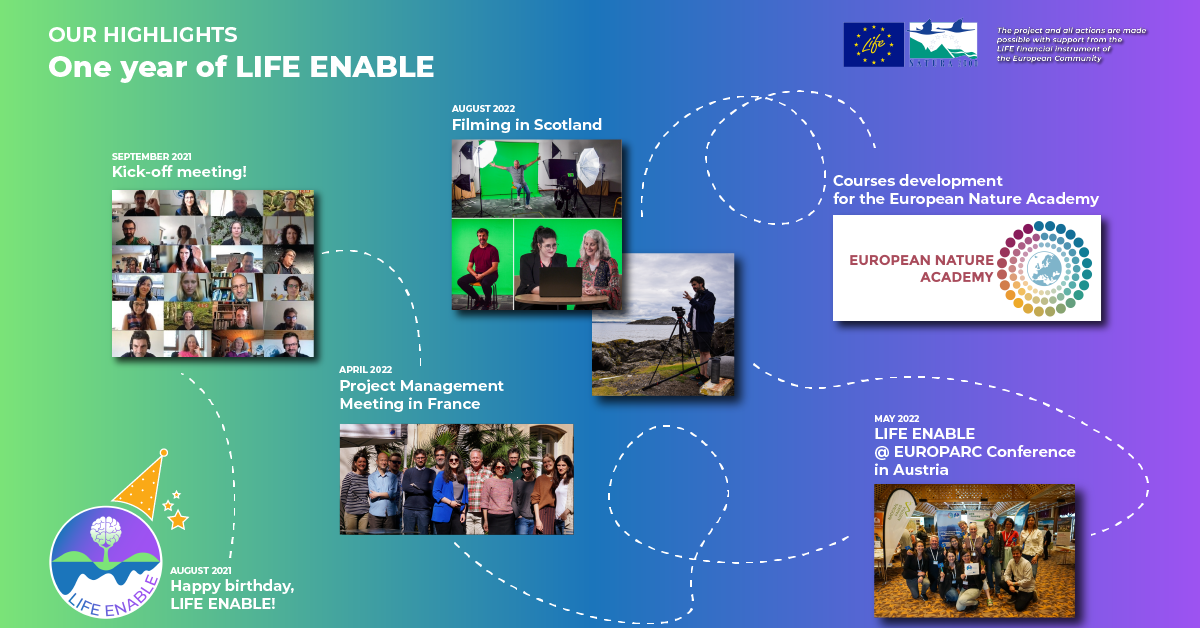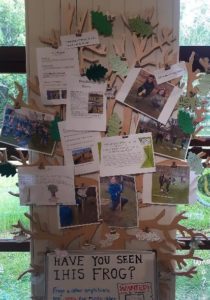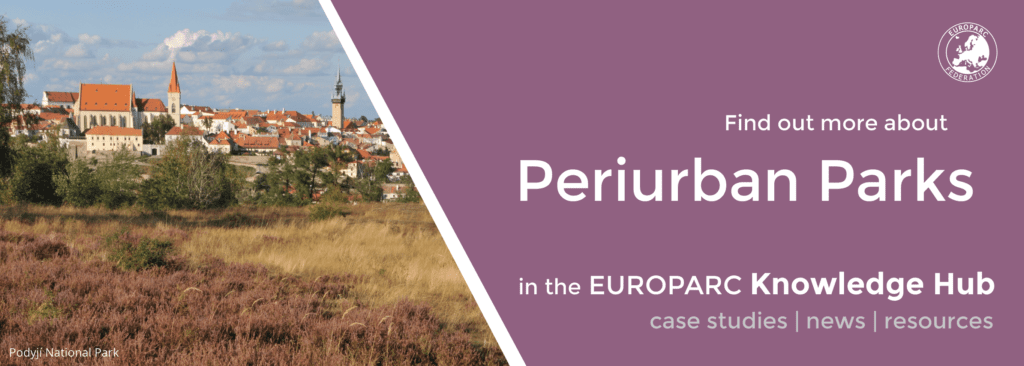Seminar Dialogue 2022 – Partnerships for Biodiversity
Every year, the EUROPARC Federation, in cooperation with DG ENV organises the Seminar Dialogue. A one-day event in Brussels organised just for EUROPARC members.
Provisional information
Since its successful launch in 2017, the Seminar-Dialogue provides EUROPARC members with a chance to sit with the European Commission to share their experience and needs for the effective management of Natura 2000 areas. We are therefore pleased to invite you to this year’s edition:
Partnerships for Biodiversity: European policies and the role of Protected Areas
TUE, 15.11.2022 (16:00 – 18:00)
EUROPARC Federation Office, Boulevard Louis Schmidt 64, 1040 Brussels
WED, 16.11.2022, (09:00 – 16:00)
European Commission, rue Breydel 2, 1040 Brussels
The event is organised in cooperation with DG ENV, with DG CLIMA also participating. It is only open to EUROPARC members. Registration closes Thursday 10th of November.
By bringing together representatives of the European Commission and Protected Area professionals, EUROPARC wants to highlight the contribution of Protected Areas to the achievement of the European policy goals, whilst giving the European Commission a clear insight into the challenges faced by professionals in the field. After two years online, the Seminar Dialogue 2022 will be in presence again.
The Seminar will count with interventions from EUROPARC members and from the different DGs, who will share the latest policy updates and funding opportunities. EUROPARC and the European Commission DG Environment have set up a programme focused on the following key areas:
- The new Restoration law: the role of, and the impact on, Protected Areas
- Nature Conservation in the Climate change context
The event is for EUROPARC members only. Places are limited, but we look forward to welcoming as many members as possible to Brussels. Participation is free of charge, but registration is mandatory. Register here.
The event will be anticipated by an internal networking meeting only for EUROPARC members, on 8th of November between 16:00 and 18:00 at the EUROPARC Federation Brussels Office.
The programme is available here:
Happy birthday, LIFE ENABLE!
Happy birthday, LIFE ENABLE
Happy birthday to LIFE ENABLE! Just over 1 year ago, the project held its kick-off meeting. A lot has happened in the last 12 months – here are some highlights!
We had our first face-to-face technical meeting in Marseille 6 to 8 April and our project workshop in the EUROPARC Conference in Austria May 2022.
The new European Nature Academy is taking form. This training hub will be the main gateway to the tailor-made courses and networking events being produced through the project.
All of the competence-based blended learning courses are now well ‘under construction’. There are 4 courses:
- Ways of working for Natura 2000 & Protected Areas across Europe. This course starts with a ‘live’ Induction Seminar in February 2023 and will be delivered in 10 online modules from March to June next year. Subjects covered include: European policies & priorities for nature; tools for participative & inclusive governance; design of communication strategies, tools and techniques; management planning as technical and social processes.
- Two courses for Forest and Marine managers to be delivered in September 2023. Both these courses will include a practical ‘on site’ workshop.
- A Train the Trainers course where 20 people will be trained to train their peers and colleagues in the courses they have themselves completed.
The training is cost-free and travel and subsistence costs to participate in the networking events will be reimbursed by the project.
Our marine and forest experts met in June this year. They are contributing to the development of marine and forest courses.
More than 25 videos have been scripted, filmed and are now in the editing phase.
And we are ready to open the call for applicants from 5 October 2022! In the first phase, 60 ‘core participants’ will be selected. The deadline to apply is 4 November 2022 and selected participants will be confirmed before the end of this year.
We anticipate a high demand – so, if you are ‘ready to be enabled’, we will welcome your application!
If you would like to get a deeper look into everything related to the LIFE ENABLE project, you can find out more in our newly published LIFE ENABLE newsletter available here!

Happy birthday, LIFE ENABLE
If you want to get all the insights and exclusive information about the LIFE ENABLE project, make sure to subscribe to our newsletter, so you don’t miss any important updates!
Exploring how Periurban Parks engage Urban Audiences
Guided visit at Sas Hegy nature reserve, on the edge of Budapest © Matthew Ross
Every year, the Alfred Toepfer Natural Heritage Scholarship supports the work of young conservationists in Protected Areas across Europe. Matthew Ross, learning and discovery ranger at the Peak District National Park, was one of the winners of the Scholarship in 2019. He travelled to Scotland and Hungary to learn more about how two Periurban Parks are approaching visitor management and nature education. The following article is written by Matthew. You can download his full report and a special toolkit at the end of the article.
The special case of Periurban Parks
Periurban Parks are a portal to nature connection for millions of people. However, the proximity to urban areas can also bring problems, with large numbers of visitors harming fragile ecosystems. Despite these challenges, there are also wonderful opportunities: we have a huge pool of people, on our doorstep, to inspire about nature! With our help, young people in these urban areas can learn to appreciate our beautiful landscapes and aspire to conserve them.
I work in the U.K’s Peak District National Park. This beautiful area is girdled by the urban areas of Manchester, Sheffield, Derby and Stoke; the threat of urban encroachment helped us become the U.K’s first national park. Seventy years later, it is these urban areas which provide a majority of the park’s visitors: millions every year!
My work involves trying to build a deeper connection between our visitors, especially young people, and the landscape. Our team provides outdoor learning experiences for schools, families, and community groups.
I have been very privileged to benefit from an Alfred Toepfer Natural Heritage scholarship, enabling me to travel to two other European national parks close to urban areas. My study aims were:
- To investigate issues caused by large visitor numbers, and how each park is trying to tackle these through engaging visitors.
- Observing engagement techniques used by parks, with a focus on inspiring young people.
- Finding out how national parks enable self-led visitors and remove barriers for less socially mobile groups.
The two parks I chose were:
- Duna-Ipoly Nemzeti Park, close to Hungary’s capital, Budapest.
- Loch Lomond & The Trossachs National Park, just outside Glasgow, Scotland.
Engaging visitors of the Parks
In each park I met staff, visited key interpretation sites and observed education sessions and events in action. It was very instructive to find parallels between our different national parks. Despite our different contexts, many of the issues we face are similar: antisocial behaviour, wildfires, traffic congestion and impacts from outdoor pursuits. These are made more severe by the volume of visitors from urban areas.

Display celebrating young people’s conservation, Loch Lomond © Matthew Ross
All three parks recognise that direct engagement offers a way, perhaps the best way, to communicate about these issues. Education sessions can provide direct care messages to audiences about environmental issues, helping to prevent problems and inspire positive action. Beyond the immediate benefits, all three parks are “playing the long game”, trying to inspire a love of nature that will filter through generations to forge a long-lasting stewardship of these landscapes.
Young people are particularly key to this. Engaging them and providing “Eureka!” moments that connect them with nature can encourage a lifetime of learning about, and caring for, our environment.
School visits, family events and activity trails all provide great ways of enabling this. Activities that allow young people to have their own, close-up connections with nature, such as pond dipping and ‘Bio-blitzes’ are especially valuable, and all three parks make this a key feature of their work. Nature play, with mud, sticks, and water is great, too!
There are also opportunities for promoting positive action through conservation. In Loch Lomond NP, junior rangers groups run in local schools, and I observed students removing invasive species from a local nature reserve. Photos and reflections from children taking part in conservation tasks are collected and displayed in the park’s visitor centre; this creates pride in their actions and helps to inspire other visitors.
Creating easy access to the Parks
Although the urban population are very closely situated to our national parks, many of them have barriers to visiting. Traditionally, our demographics have not reflected the diverse populations of our cities, and we must try to make our parks accessible to all. Loch Lomond & The Trossachs has pioneered an Educational Travel Grant, which helps enable economically disadvantaged schools and communities.
Creating ‘National Park champions’ within local communities can help inspire people to visit, and to do so responsibly. In the Peak District, we are developing community projects and an ‘Ambassador school’ scheme to this end.
Another way of engaging harder-to-reach-groups is meeting them in their local green spaces; the best connections with nature often begin at home, and sometimes these can be useful stepping stones to visiting bigger, wilder landscapes. Duna-Ipoly has pioneered a unique way of doing this: a mobile pond-dipping laboratory that travels around different areas, connecting children with nature (and the environmental issue of water quality) close to their schools.
Accessibility and engagement possibilities for independent visitors are important too. Interpretation boards, activity trails and online resources can all help with this. Duna-Ipoly even has a National Park app.
The above is just a very brief summary of the great work being done in these national parks. Learning from their innovative, inspiring staff has been very valuable, and now I hope to build on this to help my own team engage and innovate more effectively.
I feel very grateful for this opportunity, and would recommend any young people working in protected areas to apply for an Alfred Toepfer Natural Heritage Foundation scholarship.
If you’d like to learn more about some nature connection and engagement techniques, I have put together a small ‘toolkit’ of ideas that can be downloaded here.
